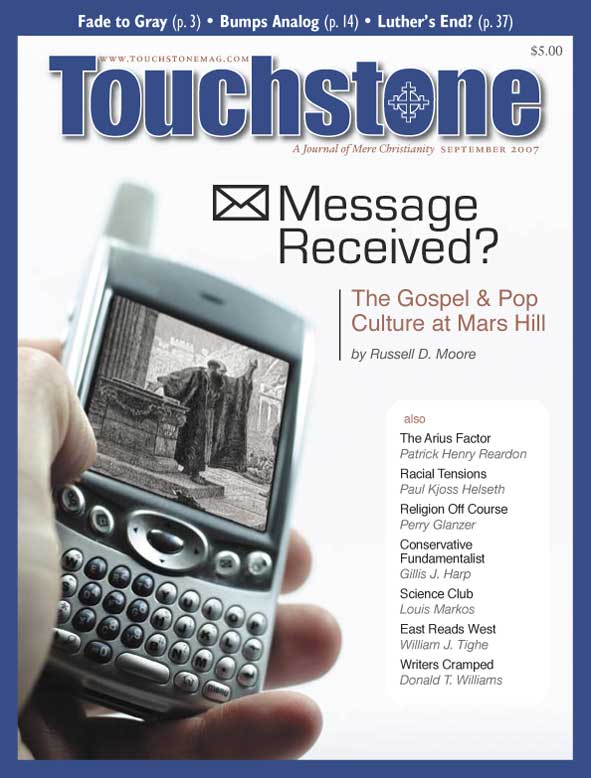Feature
Retaking Mars Hill
Paul Didn’t Build Bridges to Popular Culture
Take your choice: Christian boy bands or The Gospel According to the Simpsons. The era of the Christian who boycotted the local “movie house” is long gone—and, in many ways, that’s a good thing. But in place of the certainty that the gospel required Christians to keep themselves separate from the world of popular culture, many Christians are now just confused about how to relate the two.
Offering one answer to this confusion, many contemporary Christians often speak of the need to “engage” popular culture. What they most often mean by this is that they seek to speak in a language people shaped by popular culture can understand or that they want to “redeem” popular culture for the glory of Christ.
In my world, the world of American Evangelicalism, at least two groups have clear ways to do this. One group wants to imitate pop culture but Christianize it. Another group wants to find ways in which that culture itself presents the gospel. Both want to use pop culture to reach the wider culture, and both find their justification in Paul’s talk on that first-century Athenian hilltop described in Acts 17.
And they are right to try: If Christians are going to speak to people, Christians as well as others, who have been deeply formed by popular culture (as we must) without losing our souls, we’re going to have to decipher how to relate Mars Hill to Rolling Stone.
Off-Brand
The first model of Evangelical pop-culture engagement is that of those I call “off-brand Evangelicals.” They seek to take trends in pop culture and reproduce them in Christian dialect for use within the Evangelical subculture, with the hope of making it more attractive not only to those outside but to those within.
The impulse is deeply biblical. After all, God sanctifies commonplace, so-called secular aspects of human culture—from the rearing of sheep for sacrifice, to the goat hair used to construct the Tabernacle, to the bread and wine of the Lord’s Table. Pagans have victory suppers whentriumphant in war—so does the church, but in a uniquely Christian way.
Adapting current cultural forms for use as Christians is not, in itself, a bad idea. In fact, in many ways it is unavoidable. If our pulpits are successful in persuading Christians that Jesus is to be the central focus of the believer’s life, we should not be surprised but joyful when young Christians gifted to be hip-hop artists rap about Jesus rather than about pimps and firearms.
Still, there is a danger in a kind of co-option of popular culture for Christian use that does not discern the limits of the evangelistic and apologetic potential of such a strategy. This is especially true when the impetus behind so much of it is not ecclesial or missionary but commercial.
GQ magazine sent one of its reporters to a Christian music festival in Pennsylvania, to check out what goes on in the “Religious Right” subculture. “Christian rock is a genre that exists to edify and make money off of Evangelical Christians,” the author concluded after scoping out the Evangelical version of Woodstock.
He remarked that the most essential quality of Christian popular music was its parasitism. “Remember those perfume dispensers they used to have in pharmacies—‘If you like Drakkar Noir, you’ll love Sexy Musk?’” the journalist asked. “Well, Christian rock works like that.”
He pointed out that Christian pop music recruits “off brand” performers to ape and mimic current popular artists, to “edify” believers all over North America. Oh, and to make money off them, too.
It’s hard not to wince at the magazine’s assessment. Christian bookstores often include “comparison charts,” pointing listeners to Christian versions of the secular bands and artists they enjoy. “If you like Eminem, you’ll love Twisted Fisher.”
At its best, Christians who follow this model of pop-culture engagement identify the “language” of the contemporary context and speak through it a distinctly Christian witness. At its worst, they watch what’s happening in the culture (that is, what’s making money), and then find people slightly less talented but more in love with Jesus (or at least able to play it on TV) to do something similar (that is, make some money forthemselves).
South Park
The second model is that of those I call “South Park Evangelicals.” They’re reminiscent of the culturally libertarian hipster right-wingers who bill themselves as “South Park Conservatives” because they support a free market and a hawkish foreign policy while enjoying the crude humor of the R-rated cartoon South Park.
Of course, most of them are not as coarse and vulgar as their secular libertarian counterparts (although a few are). The similarity is at the level of identity.
The “South Park Conservatives” wish to distance themselves from their dour fellow conservatives by assuring liberal opinion-makers that they can be both right-wing and cool. They will shock more traditional conservatives to point out to them (and to the watching world), “We’re with you, but we’re not like you.” Some Evangelicals follow much the same impulse, restrained as it often is by the Holy Spirit and Evangelical mores.
This model is popular among a generation that humbly dares to call itself “the emerging church,” although it includes aging baby boomers who have been writing movie and music reviews for Christianity Today and Campus Life since the Partridge Family last had a hit record. Consciously, sometimes conspicuously, rejecting the separatism of their Evangelical fathers, and declaring that “all truth is God’s truth,” they enjoy everything from Broadway musicals to NC17 movies and nihilist grunge bands.
They turn up their noses at Christian pop culture and look for “signs of redemption” in the products Hollywood and Manhattan create. Young Evangelical bloggers seek to reach the culture “where they’re at” by showing that they can discuss the “redemptive value” of Million Dollar Baby without “quibbling” over “culture war” concerns about the ethics of assisted suicide.
House of Culture
These Evangelicals often compare their reading of pop culture to the missiological contextualization Christians attempt when working with other cultures. It is, therefore, of little value to criticize pop culture—such criticism is “fundamentalist,” “simplistic,” and “anti--evangelistic.”
“Preaching against culture is like preaching against someone’s house,” one Evangelical missiologist says. “It’s just where they live.” Contrasting the messages of pop culture with the messages of a Christian world-and-life view is the rhetoric of “culture scolds” rather than that of evangelists.
In this model, one seeks to know pop culture, not in order to imitate it, but first to enjoy it as an aspect of common grace, and second to share a common cultural dialect with unbelievers. You don’t fight a “culture war” with Hollywood, you seek to redeem Hollywood instead, by finding the aspects of contemporary music and film that are consonant with biblical truth. Christians are to highlight these commonalities, and downplay thedivergences.
Again, there is much that is commendable here. These Christians recognize that insights about God, man, and redemption cannot be found simply in the piety of believers. Even at the end of the Scripture story, at the New Jerusalem, the Apostle John tells us that “the glory and the honor of the nations” will be brought into the City, a glory that surely includes expressions of human culture—perhaps even popular culture. Moreover, these Evangelicals wish to avoid a “Christian ghetto” in which Christians are unable to speak the same basic cultural discourse as the people to whom they are called to bring Christ.
The pitfalls with this approach also include a commercial Christian industry that by its very nature, perhaps unintentionally, militates against wisdom, discernment, and balance. As with the “Off Brand” market, money is involved here, too. It’s just subtler. The younger, cooler wave of Evangelicals would never fall for a Christian version of the Backstreet Boys, much less the crass evangelistic showmanship of the last generation’s Petra or Carman musical acts. Instead they consume anti-consumerist Evangelical acts, such as Derek Webb.
Webb has traveled the country with religiousleftist Jim Wallis preaching against the “market-oriented” and “legalistic” tendencies of contemporary conservative Protestantism. He sings songs mocking an Evangelical subculture in which “they’ll know us by the T-shirts that we wear.”
Of course, Webb is making a killing selling CDs, downloadable songs, and, yes, Derek Webb T-shirts. One has to work a little harder for his nickel among the soul-patched Evangelicals, but the market is still there.
From Mars Hill
Christians seeking to “engage popular culture” point to the Apostle Paul’s speech before the Areopagus, in which he cited the lyrics of pagan poets and the architecture of pagan temples. Christians, they argue, should follow Paul and use popular culture to “build a bridge” with its consumers, finding in popular works a “common ground” through which we can attract their interest and later communicate the gospel.
The appeal to Paul’s speech is nothing new. Previous generations of Protestant liberals found in it justification for appealing to the “cultured despisers” of religion on their own terms.
If the culture embraces Darwinism, don’t unsettle them with Genesis, point to the order and beauty of the natural order. Or build a bridge from, say, existentialist philosophy to the gospel. First convince the culture of the need for a “Ground of Being” and “an ethic of authenticity” and you’ve got the inroad you need to preach the God of Abraham, Isaac, and Jacob.
But is this what Paul is doing on Mars Hill? The answer is no . The Apostle might say, “God forbid.” Often those pointing to Acts 17 wish to begin with Paul’s address itself, which starts in verse 22. But we must look first at how Paul found himself on the Hill in the first place. He was summoned there because of a controversy he evoked among the populace “because he was preaching Jesus and the resurrection” (Acts 17:18).
Paul did not start speaking in Athens with a “common ground” idea of a generic god, and then reason along to Jesus. He started with the gospel of Jesus of Nazareth, proclaiming among the Gentile philosophers exactly what he had proclaimed among the Jewish rabbis: that God had raised him from the dead. Where Paul starts is also where he ends: with the guarantee that God will bring about judgment found in the resurrection of Jesus from the dead (17:31).
Yes, Paul takes note of the altar to the unknown god, and yes, he quotes pagan poets. But in neither case is he “building a bridge,” at least not in the way the “engagers” wish to do. He is not saying, “You see part of the truth already, so let me show you what you already partlybelieve.”
He points to the altar of the unknown god to demonstrate that the Athenians themselves acknowledge ignorance. How can you pontificate about the nature of the divine, he is asking, when even you tell me that there’s something important out there you admit you don’t know?
Paul does not find in the poets some form of “redemptive analogy” he can use among a people who don’t acknowledge the authority of Scripture. He uses them to demonstrate that Athenian philosophy and culture are self-contradictory.
How can you claim that these temples house the gods, he asks, when even your own culture-mavens say the divine can’t be housed in edifices made with hands? The poets lead him not to finding “common ground” with his hearers but to calling them to repentance on the basis of a scripturally revealed storyline of humanity (17:26–27,30–31).
Unhinging the Greeks
Paul’s discourse on the Areopagus is strikingly different from many Christians’ attempts to be relevant to popular culture. He points to the Athenians’ culture not so much to bring out what they know as what they deny.
Paul systematically unhinges key facets of Hellenic thought: the multiplicity of gods, their representation by images, their dwelling in temples, Greek racial superiority, the distance of the gods from humanity. He boldly challenges the Greeks’ tribal pride in being “sprung from the soil of their native Attica” (in the words of the New Testament scholar F. F. Bruce) by pointing to the common ancestry of humanity from “one man,” with God determining the “bounds of their habitation” and “removing all imagined justification for the belief that Greeks were innately superior to barbarians.”
Moreover, the very nature of Paul’s message was an affront to the ideological underpinnings of Athenian culture. He constantly returns to the resurrection of the body. Nothing was more alien to Epicurean and Stoic thought, both of which sought to combat the fear of death by separating the prison of the body that dies from the spirit that survives. How different is Paul’s view of death and resurrection from that of, for instance, the Stoic philosopher-king Marcus Aurelius, who in his Meditations compared death with birth from the womb, “when your soul will emerge from its compartment,” the body.
Paul does indeed see a common humanity and a common imago Dei at work in Athenian culture. But he sees this common grace twisted and perverted by human rebellion. This is why he is “provoked” by the idolatry in the city (17:16). This is why he refutes the culture’s affirmation that gods can be made of gold and silver, and propped up in a man-made house (17:24–29). And this is why he warns the Athenians, in the strongest terms imaginable, to flee the wrath of the God of Jesus by repenting before his throne (17:30–31).
Contemporary attempts at engaging popular culture are partly right. We cannot ignore it. It affects life in twenty-first-century America far more than high culture, far more, even, than the middle-brow culture of Broadway and PBS.
Broadway plays now reproduce the screenplays of Disney animated movies (such as The Lion King), and not the other way around. American presidential contenders announce their candidacies on The Daily Show with Jon Stewart on the Comedy Central television network . We cannot avoid addressing pop culture, especially among the unbelieving American populace we’re seeking to evangelize. Like the round-the-clock televised Potemkin village world of Hollywood’s The Truman Show, it is almost all they know.
Pop Mission Field
This means that we must do more to engage popular culture than count curse words and exposed body parts. We do indeed find aspects of the imago Dei and common grace in the oddest of places, especially among those creating culture.
The Bible speaks of culture being “redeemed” eschatologically; cultural artifacts seem to be in view as the “glory of the nations” brought into the New Jerusalem in the new creation (Rev. 21:24–26). We shouldn’t demand personal regeneration for artists before we can enjoy their work—whether that artist is Mozart or George Jones.
Christians should ask why culture resonates with the Superman mythology of a hero from beyond the stars who rescues humanity from itself. We should ask why country-music singer Toby Keith sings about the unity-in-diversity he longs for in his song “I Love This Bar.”
We should ask why, as the City Journal’s Harry Stein points out, trashy talk shows such as The Jerry Springer Show always end with a “moral lesson for the day,” despite the fact that the rest of the broadcast has dismissed the very idea of moral absolutes. Why do gangster-rap hip-hop artists sing so much about their rage against an absent father?
We can see in pop culture what we can see also in the ideologies of Marx, Freud, Darwin, and others, even “New Atheists” like Dawkins and Hitchens: the longing for a story that makes sense of the world. In literature, films, and ballads, we can see a flash of what we know to be true—that man does not live by bread alone, or by orgasm alone, or by self-image alone. We are created to find ourselves in a storyline that begins and ends in Christ—even while, as sinners, we kick against the reality of that story.
The Christian analysis of popular culture always proceeds with a knowledge that there is enmity between the idolatries of man and the kingdom of Christ, that we are most tempted to evade Christ by looking to the works of our own hands (Is. 2:8), even, or maybe especially, when these works are culturally effective.
This means we must contrast gospels: the gospel of Jesus is always combated by other gospels—today by one that is often embedded in music, film, and visual art. And these messages are heard by our people in our pews. The people in our congregations are shaped by pop culture, a culture fueled by the advertising industry and a politically active artist guild.
And “gospel” is often not too strong a word. Sociologist Neil Postman warned in Conscientious Objections that “important television commercials take the form of religious parables organized around a coherent theology.” They play out like testimonies at a revival meeting:
In television-commercial parables, the root cause of evil is Technological Innocence, a failure to know the particulars of the beneficent accomplishments of industrial progress. This is the primary source of unhappiness, humiliation, and discord in life.
Embracing the Strangeness
To contrast the “abundant life” of Christ with the “abundant life” offered by the spirit of the age, we must understand something of what Mammon is hawking.
Previous generations needed to give heed to pop culture in order to see how Amos and Andy radio broadcasts subtly molded their hearers’ views of race and neighbor-love. It is necessary to see the attractively presented use of death as an act of love in films such as Million Dollar Baby and Cider House Rules to confront their viewers with the gospel of life.
We must bring attentive consciences to bear even on (or especially upon) the most subtle pop-culture influences. How do Everybody Loves Raymond reruns, with a scolding, yelling wife and a cringing husband seeking permission to play golf, affect the way people in our churches view marriage? How does MTV’s Pimp My Ride affect the way our teenagers and young adults read the Sermon on the Mount? How do animated Disney films such as The Little Mermaid shape the way children—and adults—hear the command to honor father and mother?
Do we really believe that suspending disbelief long enough to see Morgan Freeman as God in the film Evan Almighty—heavily marketed to Evangelical
Christians—will not affect the way we read the prophet’s vision of the Holy One in Isaiah 6?
This is not being a scold; it is being a shepherd. The shepherd must look at the world in which his sheep live and warn them of its dangers, especially the most subtle ones. But he has an even greater duty. Let us go back to Paul in Athens.
What pop-culture-engaging Christians need to understand most from Acts 17 is the Athenians’ response. Luke tells us that what arrests the attention of the Athenians is not the so-called bridges Paul builds by citing Athenian cultural products. What pricks their attention at the end is what pricked their attention at the start: Jesus and the resurrection: “Now when they heard of the resurrection of the dead, some mocked. But others said, ‘We will hear you again about this’” (Acts 17:32).
Often at the root of so much Christian “engagement” with pop culture lies an embarrassment about the oddity of the gospel. Even Christians feel that other people won’t resonate with this strange biblical world of talking snakes, parting seas, floating axe-heads, virgin conceptions, and emptied graves. It is easier to meet them “where they’re at,” by putting in a Gospel According to Andy Griffith DVD (for the less hip among us) or by growing a soul-patch and quoting Coldplay at the fair-trade coffeehouse (for the more hip among us).
Knowing Andy Griffith episodes or Coldplay lyrics might be important avenues for talking about kingdom matters, but let’s not kid ourselves. We connect with sinners in the same way Christians always have: by telling an awfully freakish-sounding story about a man who was dead, and isn’t anymore, but whom we’ll all meet face-to-face in judgment.
An Uncool Minister
Early in my ministry, I served as a youth pastor in a Baptist church near an Air Force base in Mississippi. Like every other Evangelical youth minister, I received all the advertisements from youth ministry curricula-hawkers, telling me how I could be “relevant” to “today’s teenagers.” The advertisements promised me ways I could “connect” with teenagers through Bible studies based on MTV reality shows and the songs on the top-40 charts that month.
All I knew how to do, though, was preach the gospel. Yes, I knew what was happening on MTV, and I’d often contrast biblical reality with that, but I fit nobody’s definition of cool—including my own.
A group of teenagers, mostly fatherless boys, some of them gang members, started attending my Wednesday night Bible study. Some of them arrived at the church engulfed in a cloud of marijuana smoke.
I found they weren’t impressed with the “cool” supplemental video clips provided by my denomination’s publisher. They laughed at Christian rap stars, in the same way I laughed at my high-school history teacher’s effort to “have a groovy rap session with you youngsters.”
But what riveted their attention was how weird we were. “So, like, you really believe this dead guy came back from the dead,” one 15-year-old boy asked me. “I do,” I replied. “For real?” he responded. I said, “For real.”
They were amazed at the fact that my wife and I had dinner together, and that we didn’t really want to be somewhere else. “Dude, this is like Nick at Nite,” one said, referencing the black-and-white family sitcom reruns on television each night. “The mom and dad are here, ‘how was your day,’ and the whole deal.” They couldn’t believe that in our church, elderly people and teenagers talked to one another, that Latino military officers joked around with white enlisted men around a Sunday-school coffeepot.
It seemed strange. And, just as at Mars Hill, this strangeness commanded attention. Some believed; some walked away. I was heard, and I was even loved, but I was rarely cool.
Cool Fear
Too many attempts at reconciling Christianity and pop culture, it seems to me, have to do with being seen as “relevant” by the culture on its own terms. We will never be able to do that. Pop culture is a rolling stone, and it waits for no band of Christians seeking to imitate it or exegete it.
Yes, we must learn to listen to what our culture is saying. We must remember to listen beneath the cool to the fear of a people who know that Judgment Day is coming; it’s written in their hearts (Rom. 2:15–16). We must remember to listen beneath the cynicism to men and women who experience longings that can only be fulfilled in the reign of a Galilean Carpenter-King.
Let’s not be scared to tell them that what they’re holding on to—we can see it in their films, hear it in their music—is often nonsense, and that they know that themselves. And let’s preach beyond the cool to the strangeness of an old gospel story of a crucified and resurrected Messiah. They tell us—in their own films and songs and programs—that they want a gospel, just not the one God provides.
Christians must make sense of pop culture by judging it in terms of the story we embrace. When that happens, we’ll find ourselves back on Mars Hill. But let’s make sure we’re there because we are, as Paul was, preaching Jesus and the resurrection, not because we’ve started a new business making “unknown god” action figures. We probably won’t be considered “cool” to the culture—whether or not we’re able to sell music downloads to Christians.
But, once on the Hill, let’s not be surprised if, at the mention of the resurrection of the body, a bored-looking American consumer presses the pause button on his iPod, to listen for a while.
Russell D. Moore is president of the Ethics and Religious Liberty Commission of the Southern Baptist Convention. He is a senior editor of Touchstone.
subscription options
Order
Print/Online Subscription

Get six issues (one year) of Touchstone PLUS full online access including pdf downloads for only $39.95. That's only $3.34 per month!
Order
Online Only
Subscription

Get a one-year full-access subscription to the Touchstone online archives for only $19.95. That's only $1.66 per month!
bulk subscriptions
Order Touchstone subscriptions in bulk and save $10 per sub! Each subscription includes 6 issues of Touchstone plus full online access to touchstonemag.com—including archives, videos, and pdf downloads of recent issues for only $29.95 each! Great for churches or study groups.
Transactions will be processed on a secure server.
more on culture from the online archives

33.1—January/February 2020
Do You Know Your Child’s Doctor?
The Politicization of Pediatrics in America by Alexander F. C. Webster
more from the online archives

14.6—July/August 2001
The Transformed Relics of the Fall
on the Fulfillment of History in Christ by Patrick Henry Reardon
calling all readers
Please Donate
"There are magazines worth reading but few worth saving . . . Touchstone is just such a magazine."
—Alice von Hildebrand
"Here we do not concede one square millimeter of territory to falsehood, folly, contemporary sentimentality, or fashion. We speak the truth, and let God be our judge. . . . Touchstone is the one committedly Christian conservative journal."
—Anthony Esolen, Touchstone senior editor











